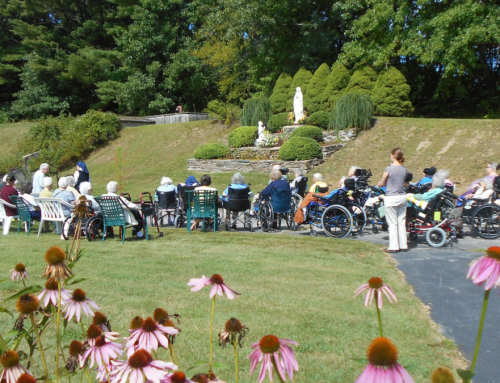Living in a fast-paced, tech focused world, can make it easy to overlook the joys that furry friends can bring into our lives, and to the lives of our loved ones. For residents in assisted living facilities, pet therapy goes way beyond the occasional feel-good moment—it can truly enhance their overall well-being.
Imagine walking into a common area of an assisted living facility. You hear laughter, see smiles, and notice a sense of warmth the room and at the center of it all, sprawled contentedly on a lap or playfully wagging their tail, is a cute little four-legged friend—a dog, a cat, or even a rabbit.
The Science Behind the Love
Research has consistently shown that with pet therapy, blood pressure can decrease, anxiety can be reduced, and loneliness can go away after elderly people interact with animals. Interacting with the four-legged furry friends has proven to release oxytocin like crazy – the so-called “hormone of love”. This not only results in better moods but also helps reduce stress and promote relaxation. With regular communication, residents of senior facilities often report increased levels of motivation and involvement into their daily routines.
Creating Community Through Connection
One of the most heartwarming aspects of pet therapy is its ability to transform the residents into a loving community. When a therapy animal visits, it draws people closer together. Residents gather around, sharing stories about their own pets or simply just enjoying the presence of their new furry friend. These moments of connection can lead to new friendships among residents who might not otherwise interact with one another.
Pet therapy can also bridge the generation gap. Bringing in pets for visits can spark conversations and engagement between residents and staff members. Everyone, regardless of age or background, can share in the joy that animals bring.
Emotional Support Beyond Words
For seniors dealing with memory loss or cognitive impairments, pets can offer a form of emotional support that goes beyond words. The simple act of petting an animal can create joy and calmness, often triggering positive memories and happiness. This non-verbal interaction can be incredibly valuable for those who may struggle to express their feelings or needs through words.
Therapy animals are trained to be gentle and intuitive, sensing when someone may need a little extra love or even a little extra space. Caregivers can observe noticeable improvements in mood and engagement of the residents during a pet therapy session.
The heartfelt stories from residents about their experiences with pet says it all. Pet therapy is an important addition to our approach to wellness as we keep exploring creative ideas. Thus, when we recognize the unbreakable connections between human beings and animals, it helps us create an atmosphere of care which enhances seniors’ lives.
At Matulaitis Rehabilitation and Skilled Care, the leading non-profit skilled nursing facility in Northeast Connecticut, we take pride in our top national rankings and five-star rating from Medicare’s Nursing Home Compare. Our compassionate staff understands that recovery after illness, surgery, or injury can be challenging, and we emphasize a holistic approach to care.
We recognize the power of pet therapy to enhance seniors’ quality of life. A wagging tail or a gentle purr can uplift spirits and create a nurturing environment where residents thrive. Our long-term care program addresses the whole person, offering personalized support, spiritual care, and a strong sense of community through engaging activities.
Please contact Matulaitis Rehabilitation and Skilled Care for more information today.






